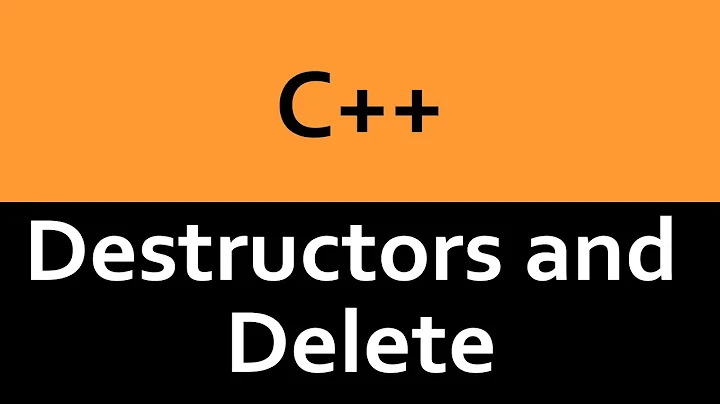Does std::list::remove method call destructor of each removed element?
Solution 1
Yes, removing a Foo* from a container destroys the Foo*, but it will not release the Foo. Destroying a raw pointer is always a no-op. It cannot be any other way! Let me give you several reasons why.
Storage class
Deleting a pointer only makes sense if the pointee was actually allocated dynamically, but how could the runtime possibly know whether that is the case when the pointer variable is destroyed? Pointers can also point to static and automatic variables, and deleting one of those yields undefined behavior.
{
Foo x;
Foo* p = &x;
Foo* q = new Foo;
// Has *q been allocated dynamically?
// (The answer is YES, but the runtime doesn't know that.)
// Has *p been allocated dynamically?
// (The answer is NO, but the runtime doesn't know that.)
}
Dangling pointers
There is no way to figure out whether the pointee has already been released in the past. Deleting the same pointer twice yields undefined behavior. (It becomes a dangling pointer after the first delete.)
{
Foo* p = new Foo;
Foo* q = p;
// Has *q already been released?
// (The answer is NO, but the runtime doesn't know that.)
// (...suppose that pointees WOULD be automatically released...)
// Has *p already been released?
// (The answer WOULD now be YES, but the runtime doesn't know that.)
}
Uninitialized pointers
It is also impossible to detect whether a pointer variable has been initialized at all. Guess what happens when you try to delete such a pointer? Once again, the answer is undefined behavior.
{
Foo* p;
// Has p been properly initialized?
// (The answer is NO, but the runtime doesn't know that.)
}
Dynamic arrays
The type system does not distinguish between a pointer to a single object (Foo*) and a pointer to the first element of an array of objects (also Foo*). When a pointer variable is destroyed, the runtime cannot possibly figure out whether to release the pointee via delete or via delete[]. Releasing via the wrong form invokes undefined behavior.
{
Foo* p = new Foo;
Foo* q = new Foo[100];
// What should I do, delete q or delete[] q?
// (The answer is delete[] q, but the runtime doesn't know that.)
// What should I do, delete p or delete[] p?
// (The answer is delete p, but the runtime doesn't know that.)
}
Summary
Since the runtime cannot do anything sensible with the pointee, destroying a pointer variable is always a no-op. Doing nothing is definitely better than causing undefined behavior due to an uninformed guess :-)
Advice
Instead of raw pointers, consider using smart pointers as the value type of your container, because they take responsibility for releasing the pointee when it is no longer needed. Depending on your need, use std::shared_ptr<Foo> or std::unique_ptr<Foo> . If your compiler does not support C++0x yet, use boost::shared_ptr<Foo>.
Never, I repeat, NEVER EVER use std::auto_ptr<Foo> as the value type of a container.
Solution 2
It calls the destructor of each of the items in the list -- but that's not a Node object. Its a Node*.
So it doesnt delete the Node pointers.
Does that make sense?
Solution 3
It does call the destructor of the data in the list. That means, std::list<T>::remove will call the destructor of T (which is necessary when T is something like std::vector).
In your case, it would call the destructor of Node*, which is a no-op. It doesn't call the destructor of node.
Solution 4
Yes, though in this case, Node* has no destructor. Depending on its internals though, the various Node* values are either deleted or destroyed by scoping rules. If Node* where some non-fundamental type, a destructor would be called.
Is the destructor called on the Node? No, but 'Node' is not the element type in the list.
As to your other question, you can't. The standard list container (in fact ALL standard containers) adopt ownership of their content and will clean it up. If you don't want this to happen, the standard containers are not a good choice.
Related videos on Youtube
Siarhei Fedartsou
Updated on July 09, 2022Comments
-
Siarhei Fedartsou almost 2 years
I have the code:
std::list<Node *> lst; //.... Node * node = /* get from somewhere pointer on my node */; lst.remove(node);Does the
std::list::removemethod call the destructor (and free memory) of each removed element? If so, how I can avoid it?-
 GManNickG over 13 yearsWhy are you storing pointers in the first place?
GManNickG over 13 yearsWhy are you storing pointers in the first place?
-
-
Siarhei Fedartsou over 13 yearsBut I have a 'Segementation fault' if I try to delete node after remove calling. :( Why it happened?
-
aschepler over 13 yearsYes. For extra clarity, the code example shown does not call
Node::~Nodeand does notdeletethenodepointer. (Though if you had aniteratorto that place in the list, it is now invalid.) -
PHcoDer about 7 years@JohnDibling It is clear that the object will not be delete-ed when its raw-pointer is erased from a container. But will it call destruct-or of the object? I think this should not be the case. But the docs say that destructor is called for the map element being deleted.
![[3 Ways] How to remove element/item from Python list? Difference Between remove, del and pop?](https://i.ytimg.com/vi/vy0WYVQeGDk/hq720.jpg?sqp=-oaymwEcCNAFEJQDSFXyq4qpAw4IARUAAIhCGAFwAcABBg==&rs=AOn4CLDciq8YRYckLEodoSqNJ8iW1mgSYw)






